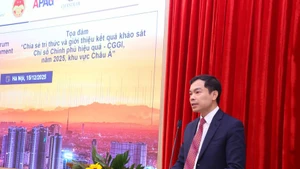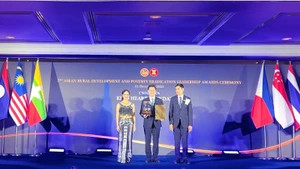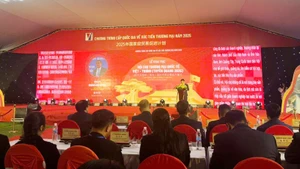This was one encouraging finding of the 2013 Provincial Governance and Public Administration Performance Index (PAPI) report, which was announced in Hanoi this morning.
PAPI is an effective policy tool used to monitor the performance of local governance and public administration. It is based exclusively on citizen experiences in their interactions with local authorities.
In 2013 alone, the survey collected the opinions of 13,892 citizens from 63 cities and provinces across the country, looking at six different dimensions: ‘Participation at Local Levels’, ‘Transparency’, Vertical Accountability’, ‘Control of Corruption in the Public Sector’, ‘Public Administrative Procedures’ and ‘Public Service Delivery’.
Five of the six dimensions showed upward trends against the 2012 figures. The ‘Control of Corruption in the Public Sector’ index was up by 4.24%; also higher were ‘Transparency’ (by 3.4%), ‘Vertical Accountability’ (1.19%), ‘Public Service Delivery’ (0.68%) and ‘Public Administrative Procedures’ (0.32%). ‘Participation at Local Levels’ showed a slight decrease of 0.33% from the previous year.
The 2013 PAPI report has broken new ground by digging deeper into the differences in governance and public administration experienced by different groups of people within provinces.
UN Resident Coordinator in Vietnam Pratibha Mehta called this chapter in focus, “a special feature that contains a new angle in analyzing the data”, adding that, “the PAPI report shows that quality of services is uneven not only across, but also within, provinces”.
According to the PAPI results, women, the poor, ethnic minority members and those without government connections are less satisfied than other citizens with the quality of local governance, even within the same district or village.
The ‘Public Administrative Procedures’ and ‘Public Service Delivery’ parameters show more consistency in citizen satisfaction across the board, while the data show that corrupt practices disproportionately affect the poor and the disadvantaged.
The central coastal province of Quang Binh performed best (over 42 of 60 points) in all six dimensions, while the northern province of Bac Giang is at the bottom end of the scale in all dimensions, according to the PAPI results.
The survey also reflects trends in provincial governance and public administration performance over time. Ba Ria–Vung Tau, Long An and Quang Binh provinces have consistently received positive assessments from their citizens, placing them among the best-performing group for three consecutive years from 2011-2013.
In addition, the number of provinces scoring over 40 points increased from four in 2011 to 10 in 2013, while the number of those scoring below 35 points decreased from 11 to one.
The PAPI initiative was first piloted across three provinces in 2009 and expanded to 30 provinces in 2010. It has been conducted on the national scale since 2011. Over the past five years, PAPI has captured and reflected the experiences of nearly 50,000 citizens.
It provides evidence for policymakers to monitor the implementation of existing programmes and to redesign policies and interventions at the central and provincial levels, aiming to improve the quality of local public services.






![[Video] Ha Noi: Specialised policies drive sustainable poverty reduction breakthroughs](https://en-cdn.nhandan.vn/images/8f440db7b9bfe62cb5397a6750a8b01bbaf06a77cd3ba844b6a06b6142d24086491b89243c34896c7911c3e80101275f91bf1e90a5f8d4ce13dc0f62a878f516/hanoi.jpg.webp)









